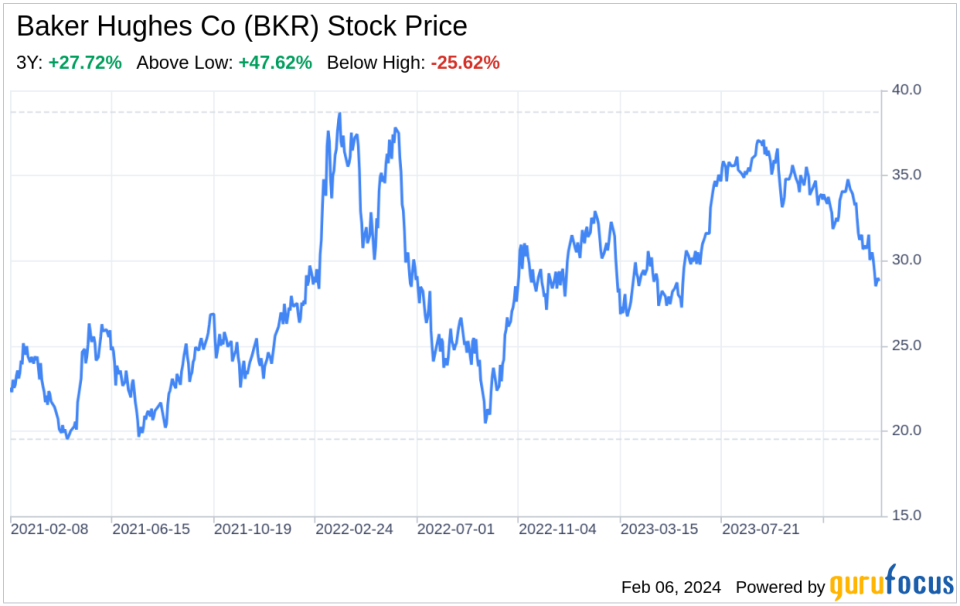Beyond the Balance Sheet: What SWOT Reveals About Baker Hughes Co (BKR)
Comprehensive SWOT analysis based on Baker Hughes Co's latest SEC 10-K filing.
Deep dive into the company's strengths, weaknesses, opportunities, and threats in the context of a dynamic energy market.
Financial overview and strategic insights to inform investment decisions.
On February 5, 2024, Baker Hughes Co (NASDAQ:BKR), a global leader in energy technology and services, released its annual 10-K filing, providing a detailed account of its financial performance and strategic direction. The company's financial tables reveal a robust portfolio with significant investments in new technologies and a commitment to sustainability, reflecting a strong balance sheet and potential for growth in diverse energy markets. This SWOT analysis aims to distill the complexities of Baker Hughes Co's financials and strategic initiatives into a clear narrative for investors, highlighting the company's competitive positioning and future prospects.

Strengths
Technological Leadership and Diverse Portfolio: Baker Hughes Co (NASDAQ:BKR) stands out for its technological innovation and a diversified portfolio that spans the energy and industrial value chain. With a history of over a century and operations in more than 120 countries, the company's technological advancements have cemented its position as a leader in the oilfield services sector. Its investments in digital applications, including analytics, and its intellectual property portfolio, including patents and trademarks, are pivotal to its competitive edge. The cross-license agreement with General Electric allows Baker Hughes Co to utilize essential IP, ensuring the company maintains its technological leadership.
Commitment to Sustainability: Baker Hughes Co's focus on environmental, social, and governance (ESG) factors is a significant strength. The company's commitment to reducing Scope 1 and 2 carbon emissions and its active role in the energy transition towards net-zero emissions demonstrate its dedication to sustainability. This commitment not only enhances the company's reputation but also aligns with the growing demand for environmentally responsible energy solutions, potentially opening up new markets and customer segments.
Weaknesses
Exposure to Market Volatility: Despite its strengths, Baker Hughes Co (NASDAQ:BKR) is not immune to the inherent volatility of the energy sector. The company's reliance on raw materials such as steel alloys, chromium, and nickel, which are subject to price fluctuations, poses a risk to its cost structure and margins. Additionally, the company's operations can be affected by seasonal events like hurricanes or extreme weather, which can disrupt operations and impact financial performance.
Dependence on Oil and Gas Markets: While Baker Hughes Co has a diversified portfolio, it still maintains a significant exposure to the oil and gas markets. The transition to renewable energy sources and the global push for net-zero emissions could lead to a decline in traditional oil and gas activities over time. This shift presents a challenge for Baker Hughes Co as it may need to accelerate its diversification into new energy areas to mitigate the risks associated with a potential decrease in demand for oil and gas services.
Opportunities
Energy Transition and New Markets: The global energy transition presents significant opportunities for Baker Hughes Co (NASDAQ:BKR). The company's investments in new energy areas such as geothermal and carbon capture, utilization, and storage (CCUS) position it to capitalize on emerging markets. By leveraging its technological expertise and innovation, Baker Hughes Co can expand its offerings and tap into the growing demand for sustainable energy solutions, potentially driving future growth.
Expansion of Digital Solutions: The company's focus on digital transformation and the development of new digital applications provides an opportunity to enhance its service offerings and operational efficiency. By offering advanced analytics and other digital solutions, Baker Hughes Co can differentiate itself from competitors and create additional value for its customers, leading to increased market share and revenue streams.
Threats
Regulatory and Environmental Risks: Baker Hughes Co (NASDAQ:BKR) operates in a regulatory environment that is becoming increasingly stringent, especially concerning data privacy, security, and environmental standards. Compliance with these evolving regulations requires significant resources and can lead to increased costs. Moreover, any failure to comply could result in penalties, damage to the company's reputation, and a potential loss of business.
Competitive Pressure: The energy technology sector is highly competitive, with numerous players vying for market share. Baker Hughes Co faces competition from both established companies and new entrants that may offer similar or more innovative products and services. To maintain its competitive position, the company must continue to invest in R&D and offer superior technology and services, which could strain financial resources.
In conclusion, Baker Hughes Co (NASDAQ:BKR) exhibits a strong foundation built on technological leadership, a diversified portfolio, and a commitment to sustainability. However, it must navigate the challenges of market volatility, dependence on the oil and gas sector, regulatory risks, and competitive pressures. By leveraging its strengths and addressing its weaknesses, Baker Hughes Co can capitalize on the opportunities presented by the energy transition and digital transformation while mitigating the threats that could impact its long-term success.
This article, generated by GuruFocus, is designed to provide general insights and is not tailored financial advice. Our commentary is rooted in historical data and analyst projections, utilizing an impartial methodology, and is not intended to serve as specific investment guidance. It does not formulate a recommendation to purchase or divest any stock and does not consider individual investment objectives or financial circumstances. Our objective is to deliver long-term, fundamental data-driven analysis. Be aware that our analysis might not incorporate the most recent, price-sensitive company announcements or qualitative information. GuruFocus holds no position in the stocks mentioned herein.
This article first appeared on GuruFocus.
